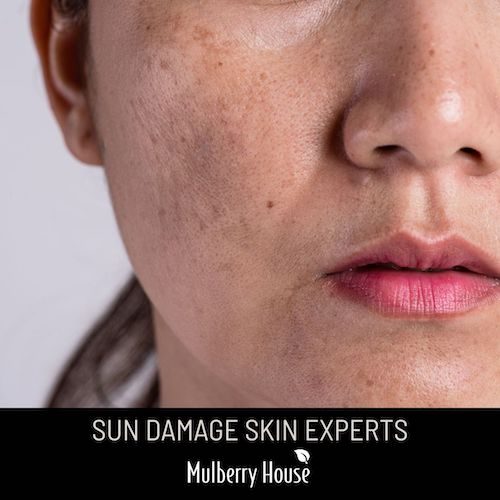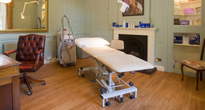
These darker areas of pigmentation are the result of overactive melanocytes – the cells that produce melanin pigmentation.
The condition is susceptible to sun exposure and most sufferers find that it looks worse following sun exposure – even with SPF protection and time spent in the shade.
It is often referred to as the “mask of pregnancy” because it frequently appears in pregnant women, but it can affect anyone.
If you are noticing the signs of melasma, then read on as our blog has essential information on this subject.
Causes of Melasma
The precise cause of melasma is not fully understood, but several factors may contribute to its development:
- Hormonal Changes: Fluctuations in hormones, especially during pregnancy, hormonal contraception, or hormone replacement therapy, can trigger melasma.
- Sun Exposure: Ultraviolet (UV) radiation from the sun can exacerbate melasma by stimulating melanocytes (pigment-producing cells).
- Genetics: A family history of melasma increases the likelihood of developing the condition.
- Skin Type: Melasma is more prevalent in individuals with darker skin types (Fitzpatrick skin types III to V).
- Certain Medications: Some medications that affect hormonal levels can also trigger melasma.
Melasma predominantly affects women, particularly those of childbearing age, although men can also develop the condition. People with darker skin types are generally at higher risk for developing melasma.
Will It Disappear?
Melasma may resolve on its own, especially after the hormonal changes associated with pregnancy or oral contraceptives stabilise. However, it can also persist for months or even years if not treated, and many people experience recurrences with further sun exposure. Avoiding triggers, particularly the sun, can help reduce the likelihood of recurrence.
To minimise the risk of developing melasma or to prevent its recurrence:
- Sun Protection: Use broad-spectrum sunscreen with an SPF of 30 or higher, wear hats, and seek shade when outdoors.
- Minimise Sun Exposure: Try to limit time in the sun, especially during peak hours (10 a.m. to 4 p.m.).
- Hormonal Control: If hormonal changes trigger melasma, discuss alternative contraceptive methods with a healthcare provider.
- Skincare Routine: Use gentle skin products and avoid potential irritants.
Melasma Treatment Options
The condition requires careful management, but with the latest advances in technology, there are a range of options that can be considered.
Exfoliation
Professional exfoliation of the skin’s surface removes the outermost cells that contain the pigment, revealing clearer skin and promoting a more even skin tone. A number of options can help the milder cases of melasma:
- Facial Peels to professional strength
- Microdermabrasion
- ResurFX laser skin resurfacing
Skin Stimulation
Treatments that promote skin healing and regeneration can be helpful in restoring a better complexion
- Microneedling is a process where the skin is given tiny wounds with sterile needles. This works to help creams or serums penetrate deeper into the skin while also stimulating cell renewal. Mulberry House Clinic offer both Genuine Dermaroller – ideal for larger areas – or Derma FNS (Fractional Needling System), a motorised device which is great for targeting smaller and specific areas of need
- M22 IPL and Laser system may be considered in order to target the pigment-producing cells (melanocytes) but this is not always suitable
Skincare Regime
The advances in cosmeceutical skincare mean that effective daily regimes can be used either alongside or instead of professional treatments.
Ingredients to look for include Hydroquinone (skin-lightening agent that reduces pigmentation), Tretinoin (retinoid that promotes cell turnover and can enhance the effects of other topical treatments), Azelaic Acid and Kojic Acid. Choosing cosmeceutical products or prescription skincare provides access to these types of ingredients in medical-grade strength.
A good skin clinic will be able to offer a number of brands for best choice. Mulberry House Clinic based in Northamptonshire offers;
- ZO Skin Health is a range that offers extensive options and can help to improve some very challenging skin conditions. It is a prescription-only skincare range, available at Mulberry House Clinic
- CellDerma advanced skincare based on the latest scientific research and backed by clinical studies. Just 1-2 products can achieve remarkable transformative results on a range of conditions and concerns.
- Obagi Medical Products – both the Nu-Derm range and the CRX ranges.
Melasma Treatment Advice & Results
Dr John Tanqueray, founder of Mulberry House Clinic, advises clients to have realistic expectations with regard to melasma treatment. He explains:
“Melasma is difficult to treat successfully. A lot of treatments are promoted for treatment of melasma but in my view few deliver good results (especially things like light peels and microdermabrasion). Laser has risks of either being ineffective or even making the problem worse.
“My first line recommendation is usually to use prescription skincare.”
Preventative & Maintenance Measures
Dr Tanqueray continues:
“Even if you do nothing else be sure to use high factor sunscreen on a daily basis, as there is evidence that this can prevent deterioration and even result in some improvement. Avoid using lightening creams from unknown sources as these can be harmful.
“Even if you are able to achieve a good result with treatment, the problem is a long term one so ongoing maintenance treatment will be necessary to keep that result.”
Mulberry House Clinic
Established 2003
Mulberry House Clinic has an excellent reputation in the Northampton area as an independent, doctor-led practice with over 20 years experience. Cosmetic skin treatments are carried out by Dr John Tanqueray, who works closely with leading manufacturers to remain at the forefront of the medical aesthetics.
A private consultation is the starting point for all patients in order to facilitate a full discussion about the desired results as well as detailed facial and skin assessment. Find out more about first consultation.
For further information or to arrange a confidential consultation, please complete our contact form, call 01604 702630 or email: info@mulberryhouseclinic.co.uk.







